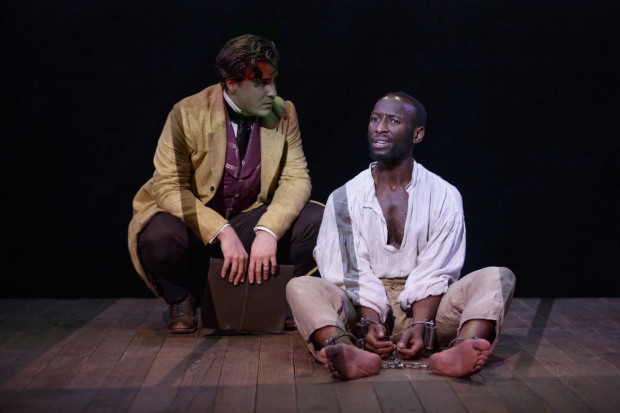Nat Turner in Jerusalem

(© Joan Marcus)
Nat Turner in Jerusalem, Nathan Alan Davis' new play at New York Theatre Workshop, offers a detailed imagining of Nat Turner's last night in prison before his hanging at the gallows of Jerusalem, Virginia. Sentenced to death for leading the famously gruesome 1831 slave rebellion, Turner's status as hero or villain has been a matter of public and scholarly debate ever since. Davis now weighs in on the matter with his two-actor, three-character work of historical fiction, spinning a specific narrative from this thin slice of history. However, the most interesting part of the creative exercise is not the activity inside Turner's cell, but the breadth of its implications about our relationship with history as a whole — whether 200 years past or flooding your Twitter feeds as we speak.
Fittingly, Nat Turner's official world premiere falls on the night of a presidential debate that has been preemptively classified as "historic" — for it's not the events themselves that make history, but rather, the way we shape and reshape them over the proceeding days, weeks, and potentially generations. Nat Turner's violent protest in 1831 has been shapeshifting for nearly two centuries, fluctuating between the actions of a brave, intelligent, and deeply religious man executing holy vengeance — and the misguided impulses of a rabble-rouser whose outburst only worsened conditions for his fellow slaves.
Davis and director Megan Sandberg-Zakian's version of Nat Turner, performed with stately precision by Phillip James Brannon (who never leaves the stage for the whole 100 minutes), is heavily influenced by The Confessions of Nat Turner. The document, written by attorney Thomas R. Gray who represented many of the slaves tried in the wake of Nat Turner's rebellion, supposedly contains Turner's firsthand testimony and paints a picture of a man who believes himself a divine prophet and speaks with unusual eloquence for a presumably uneducated slave. While the audience is allowed their skepticism about Turner's divine status, Brannon's performance is steadfast in its conviction, making us wonder if what we're witnessing is utter madness or true messianic serenity.
That same question is put to Turner's two visitors (both performed with specificity by Rowan Vickers) who come to the convict throughout his last night on death row. Gray is the first to appear after Turner waxes poetic about his final sunset (manifested by Mary Louise Geiger's simple lighting design, centered around a barred window that hangs from the center of the ceiling). Gray, a mild-mannered southern gentleman, hopes to take down a fair account of Turner's official confession, along with details about other slave rebellions that may be in the works — a mutually beneficial exercise that will spread Turner's message, quell fears throughout the South, and put some money in Gray's empty pockets. The other guest is a young guard (played by Vickers with an appropriately juvenile combination of cowardice and bravado) whom Turner took a liking to after he kindly gave the feared prisoner half a loaf of homemade bread.
As the conversations unfold, it becomes clear that Turner's priority is to convince these two gentlemen of his divinity and the moral rectitude of his deadly actions. The dialogue employed to that end is filled with lovely prose and discerning metaphors (including a particularly graphic one about popping mosquitos). Though with little in the way of plot to prop up the dense language, and characters who seem immovable from their initial positions, the story can occasionally amble through the long night.
Time becomes the only narrative arc connecting the wandering talk, with only subtle shifts in light and the slow journey of set designer Susan Zeeman Rogers' platform stage across the NYTW space to indicate any progression. However, as the sun begins to rise again on Nat Turner, cracks finally begin to appear in his character's heavenly certainty. It's a microscopic internal shift but one that is powerfully resonant from all sides of history. After all, we should know by now that it takes only the slightest change of perspective to reveal an entirely new version of the truth.











